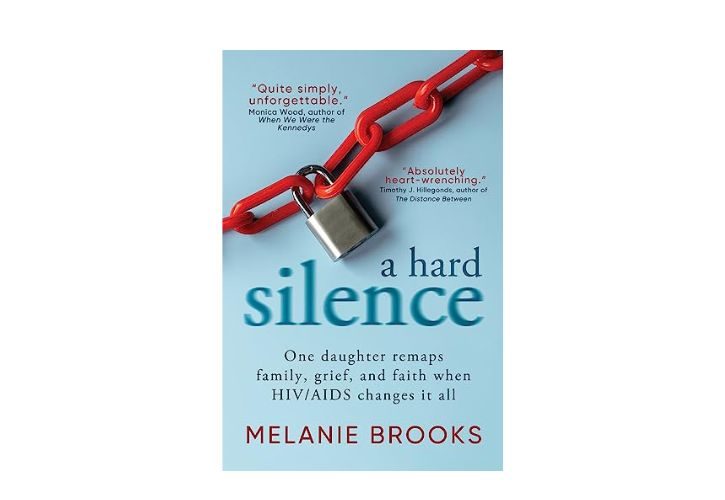How the HIV/AIDs Epidemic in Canada Changed My Family’s Life Forever

Melanie Brooks’s father was infected with HIV from contaminated blood in the mid-1980s. He decided to keep his illness a secret, and died 10 years later. Brooks’s candid memoir, A Hard Silence, looks at the consequences of her family’s secret-keeping and, in this excerpt, interrogates the stigma and discrimination that played into their decision to hide the truth.
In the 1980s and mid-1990s, few people were apologizing for their ignorant, often misguided, and cruel responses to the growing AIDS pandemic. My dad learned of his infection in December of 1985 when, eight months after his surgery, a public health official identified the blood he’d been given as contaminated, and his doctors tested him to confirm the disastrous news. We lived then in a frightened society. A society that largely believed that people diagnosed with HIV were responsible for their own infection.
The early days of the HIV/AIDs crisis
In a feature piece in the fall of 1985, Time magazine called people with AIDS “The New Untouchables.” Inconsistent and conflicting messages of how HIV spread made people afraid of even coming into contact with someone infected with the virus. When one child in a New York City school was identified as having AIDS, crowds of parents picketed the streets of New York wearing shirts reading: No AIDS in Our Schools and called on the city to pass legislation banning the child admission. In an op-ed for the New York Times, commentator William F. Buckley, Jr. called for all HIV-positive persons to be branded, saying, “Everyone detected with AIDS should be tattooed.” In Canada, members of groups with names like “Citizens Demanding the Right to Know” spoke in public forums and accused medical experts of hiding the truth about the disease.
Officials from the Canadian government’s health department debated protective measures as radical as publicly identifying all individuals who tested positive for HIV and enforcing mandatory quarantines to protect the general population. Many people known to be HIV positive or have AIDS were fired by their employers, evicted by their landlords, and shunned by their neighbors. Because of systemic inequities in community structures and healthcare, and the exclusion of Black voices from the public conversations and education initiatives, communities of color faced disproportionate infection rates. And since that time, those disparities have only deepened.
Religion and the AIDs epidemic in Canada
And then there were those who claimed AIDS as a weapon of God’s wrath. The evangelical Christian right was one of the loudest voices of discrimination in the 1980s. Jerry Falwell, an influential Southern Baptist preacher, televangelist, and founder of the Moral Majority, which was a political action group associated with the Republican Party whose agenda reflected fundamentalist Christian concepts of morality, declared, “AIDS is not just God’s punishment for homosexuals; it is God’s punishment for the society that tolerates homosexuals.” Conservative commentator Pat Buchanan, a close advisor to President Reagan, called AIDS “Nature’s revenge on homosexuals.”
This message of hatred and intolerance trickled down and established a church culture where those infected with HIV, condemned for bringing on
their own demise, were not only unwelcome, they were also denied the care and compassion that Christianity ardently preached. Elements of this harmful theology played a considerable role in shaping my family’s isolated trajectory. As a devout Christian, my father struggled to reconcile his situation with society’s and the evangelical church’s perceptions of his disease and its causes. He’d grown up in a fundamentalist church tradition that believed homosexuality was a sinful lifestyle choice. The homophobia that sprouted from that belief was fixed in him. As a young girl, I took that belief for granted because I knew nothing else.
Throughout my childhood, I learned from him and that same church tradition, the faith platitude, “Love the sinner; hate the sin,” that conveniently allowed me and other Christians I knew to pass judgment (under the guise of “Christian love”) on members of the LGBTQ+ community. My father’s implicit and explicit messages about homosexuality—including a tendency to indelicately point out the friends in my brothers’ circles who he concluded were “homos”— amplified in our household the shame and deviance that many in the 1980s mainstream culture already associated with the gay community. Meanwhile, my heart hurts for my brother David who, for eighteen years, lived closeted in that environment, unable to find safe space to be himself amidst these barriers.
My dad’s experience with HIV
My family’s social network was insular, making it easy to diminish and condemn a group that felt far-removed from our lives. Even when the reality of my dad’s HIV status had the potential to bridge that separation, he could not acknowledge the connection because he was entrenched in the mindset of the religious institutions that blamed the gay community for the spread of HIV. As a result of delayed and apathetic public and government response to the disease, support mechanisms for people living with HIV/AIDS were established almost exclusively by activists within the gay community. These mechanisms seemed beyond my father’s reach, and any nod in the direction of their activism antithetical to his religious upbringing. His prejudice also fueled his fears that his personal reputation was at risk. What if people believed he was gay?
In the twenty-plus years since David came out to our family, I’ve watched my mother’s beliefs about homosexuality pivot far away from the fundamentalist views she and my father espoused when I was younger, as her experience and understanding has broadened.
I’d like to think Dad would be different today, too, but the chance to know was taken from us before his evolution had the opportunity to begin. I do know that when he received his diagnosis, Dad saw AIDS and all of its associations as threats to everything he valued. Even though he was an accomplished physician, Dad felt disempowered by the limitations of his and the greater health system’s knowledge about the facts of HIV. AIDS was a mystery.
Staying silent
The only certainties were that the disease spread at a rapid rate and there was no cure. He expected that, like most patients he knew or knew about, he could die at any time, in any number of terrible ways. He was unwilling to chance infecting his patients, and he made the painful choice to end his medical practice, taking an advisory position in a national medical legal association. He refused to allow his family to endure any form of ostracism because of his HIV status.
His illness would be a secret from almost everyone. A secret we’d all keep. We didn’t know that Dad would live past that first year, or for the next ten years. And we didn’t know that long after the secret was exposed, we’d continue to carry its silence.
Excerpted from A Hard Silence,by Melanie Books. Copyright 2023. Published by Vine Leaves Press. Reproduced by arrangement with the Publisher. All rights reserved.
$37, amazon.ca

Next: Caring For My Dying Mom Showed Me That Caregivers Need More Support, Too




